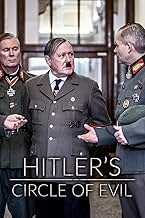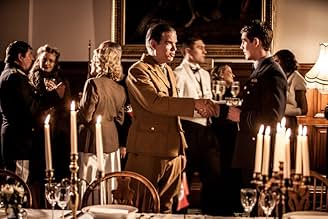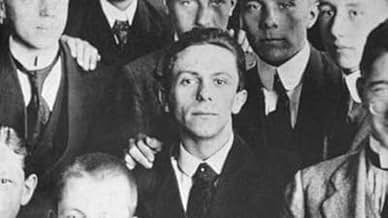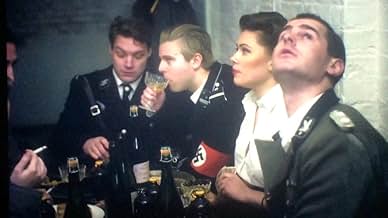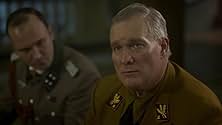IMDb RATING
8.0/10
5.5K
YOUR RATING
This is the story of the rise and fall of the Third Reich told like the drama it really was: through the personal relationships of the movers and shakers of the Nazi Party.This is the story of the rise and fall of the Third Reich told like the drama it really was: through the personal relationships of the movers and shakers of the Nazi Party.This is the story of the rise and fall of the Third Reich told like the drama it really was: through the personal relationships of the movers and shakers of the Nazi Party.
Browse episodes
Featured reviews
This excellent historian-narrated docu-drama retells the history of the making of the Nazi party and the Third Reich by focusing on the interplay of the main characters at the center of it all: Hitler and his inner circle of Nazi leaders. For me, the series rates very highly among many others in the genre for the seamless use of archival photos and footage, rich and convincing dramatization, and constant narrative driven commentary by numerous historians. The use of music to heighten the drama is not too intrusive, and is actually effective. One can forgive the British historians for their obvious bias in describing Hitler and his henchmen as "evil" and "deranged" because they were! Yet, it is important to take in the lessons the narrative also presents (with less obvious emotional force) in how Germany's economic ruin after WWI and the colonial ambitions of other European powers at that time abetted the drive toward the rabid nationalism that Hitler promoted... lessons that America had taken in far better than Britain and other Allies following WWII with the brilliant Marshall Plan. Back to this production, though: Even if you are well familiar with the history of the Nazi party, Hitler's Circle of Evil is fascinating and even entertaining viewing.
I find the suggestions in some of the reviews that the Nazis were NOT irrational disturbing. There is one major argument to be made *for* their rationality: that the objectives of WWII were the same as WWI, and no one calls Kaiser and his crew irrational or nuts. On the other hand the military campaigns, in spite of the success against Poland and France, were nuts, as was the huge diversion of resources to the holocaust. Hitler's chief engineer Fritz Todt told him the Germans were going to lose in October 1941 and that he should negotiate a German withdrawal with Stalin. (whoops! sorry bout that!) But, even so, the series is explicit about the talents of some of these men: Goebbels was a capable orator, Goring seemed to have a better appreciation of grand strategy than most of the other party luminaries, Himmler had strong bureaucratic and organizational skills. They are really depicted as rational agents in thrall to an irrational ideology.
But what about the series? It is one of many possible ways to get into the vast and complicated topic that is WWII. The focus on domestic politics leaves out some important issues, such as the Soviet-German pact to divide Poland, but this series is not really about "total context." This series is about the personalities of the Nazi party. It helps you distinguish who was who, Goring from Goebbels, Himmler from Heydrich, Hesse, and so on. You don't get the generals. Just the major Nazi party figures.
If you watch this series with an extra resource, and every now and then pause the presentation to look up this or that, you will find it a useful way to get the feel of the Third Reich's major politicians. If you want a printed resource try the Oxford (single volume) encyclopedia of WWII. Or alternatively, take the time to use your tablet or phone to look up some of the topics that interest you on Wikipedia.
Almost any one of the WWII documentaries is *better*. For example, the famous "World at War" series from the 1970s. However, in that series, as you zip around battles and generals and politicians on both sides of the Atlantic and in Asia, you lose sight of the inner circle. The narrow focus of this series, in spite of its repetitive reality-show-ish format, is a very good first step into learning about the war and why these guys were hanged at Nuremberg (those that they could round up). As is often the case for such a complicated topic, every now and then something drops that I hadn't thought of, even though I have read a lot about WWII. For example, the series' argument that the plan to deport the Jews to Madagascar had to be shelved because the Germans lost the Battle of Britain (thus leaving the British with supremacy on the seas) was interesting. Very likely the Nazis would have gone ahead with extermination anyhow, but there are interconnections that I haven't made before. That Heydrich chaired the Wannsee conference was something else that had slipped my attention, even though I knew about the Wannsee conference. Goring's control of Prussia and its police/domestic espionage operation were news to me. The role of Martin Borman as a puppet master is also highlighted by the series, even though many treatments of the war tend to keep him in the background.
So all in all there's some good material in here. If this were the Michelin Guide I would give it a one star meaning "worth the trip." So I think this offers something to the WWII buff and it is also an interesting side trip if you find your regular viewing derailed by erratic shooting schedules. My main current series (such as Expanse, Babylon Berlin, and Game of Thrones) are all in suspension. If you like history and want to stream something that has a relatively short span from beginning to end this is a good option. The Germans lose WWII. Is that a spoiler?
But what about the series? It is one of many possible ways to get into the vast and complicated topic that is WWII. The focus on domestic politics leaves out some important issues, such as the Soviet-German pact to divide Poland, but this series is not really about "total context." This series is about the personalities of the Nazi party. It helps you distinguish who was who, Goring from Goebbels, Himmler from Heydrich, Hesse, and so on. You don't get the generals. Just the major Nazi party figures.
If you watch this series with an extra resource, and every now and then pause the presentation to look up this or that, you will find it a useful way to get the feel of the Third Reich's major politicians. If you want a printed resource try the Oxford (single volume) encyclopedia of WWII. Or alternatively, take the time to use your tablet or phone to look up some of the topics that interest you on Wikipedia.
Almost any one of the WWII documentaries is *better*. For example, the famous "World at War" series from the 1970s. However, in that series, as you zip around battles and generals and politicians on both sides of the Atlantic and in Asia, you lose sight of the inner circle. The narrow focus of this series, in spite of its repetitive reality-show-ish format, is a very good first step into learning about the war and why these guys were hanged at Nuremberg (those that they could round up). As is often the case for such a complicated topic, every now and then something drops that I hadn't thought of, even though I have read a lot about WWII. For example, the series' argument that the plan to deport the Jews to Madagascar had to be shelved because the Germans lost the Battle of Britain (thus leaving the British with supremacy on the seas) was interesting. Very likely the Nazis would have gone ahead with extermination anyhow, but there are interconnections that I haven't made before. That Heydrich chaired the Wannsee conference was something else that had slipped my attention, even though I knew about the Wannsee conference. Goring's control of Prussia and its police/domestic espionage operation were news to me. The role of Martin Borman as a puppet master is also highlighted by the series, even though many treatments of the war tend to keep him in the background.
So all in all there's some good material in here. If this were the Michelin Guide I would give it a one star meaning "worth the trip." So I think this offers something to the WWII buff and it is also an interesting side trip if you find your regular viewing derailed by erratic shooting schedules. My main current series (such as Expanse, Babylon Berlin, and Game of Thrones) are all in suspension. If you like history and want to stream something that has a relatively short span from beginning to end this is a good option. The Germans lose WWII. Is that a spoiler?
I have to disagree respectfully with the other two reviews on this documentary series, I found it very good and enjoyed it.
This series presents the Nazi high command as people in a way that I had never seen in any previous documentary or book. The writers made good and frequent use of many primary source documents - diaries, letters, court transcripts, memos and other materials - so I would in no way class this as "propaganda." I think this series is an admirable work that probably represents many hours of research and puts together information I had never seen presented like this.
Hitler, Goebbels, Himmler, Goering, Speer and others were not inhuman monsters who just sprang up out of nothing, they were people who behaved monstrously, and neither were they supermen nor military geniuses. This documentary gives a detailed picture of who they were as individuals through how they interacted with each other, and how these monstrous, flawed humans destroyed themselves and their own country.
This series presents the Nazi high command as people in a way that I had never seen in any previous documentary or book. The writers made good and frequent use of many primary source documents - diaries, letters, court transcripts, memos and other materials - so I would in no way class this as "propaganda." I think this series is an admirable work that probably represents many hours of research and puts together information I had never seen presented like this.
Hitler, Goebbels, Himmler, Goering, Speer and others were not inhuman monsters who just sprang up out of nothing, they were people who behaved monstrously, and neither were they supermen nor military geniuses. This documentary gives a detailed picture of who they were as individuals through how they interacted with each other, and how these monstrous, flawed humans destroyed themselves and their own country.
Lovely presentation of historic facts. Beautifuly filmed. A source of knowledge of Second World War.
Better understanding of the roles of these terrible protagonists is the War
I have seen a number of documentaries about German history through the two World Wars, but this is the first one that actually reveals the intricate interpersonal relationships among a group of deranged individuals that lead a political party from relative obscurity into the driving force behind a national and global tragedy. The group comprising Hitler's 'inner circle' were all psychologically unbalanced and fanatical individuals. It is interesting to see how they were able to use the socio-economic circumstances of Germany to convince a substantial portion of the German population to adopt their arrogant and wicked philosophy. Bravo to the producers of this documentary for showing an original perspective on the events of history!
- How many seasons does Hitler's Circle of Evil have?Powered by Alexa
Details
- Release date
- Country of origin
- Language
- Also known as
- W kręgu zła: Ludzie Hitlera
- Filming locations
- Production companies
- See more company credits at IMDbPro
- Runtime50 minutes
- Color
- Aspect ratio
- 16:9 HD
Contribute to this page
Suggest an edit or add missing content



